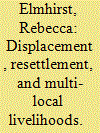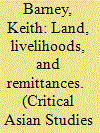|
|
|
Sort Order |
|
|
|
Items / Page
|
|
|
|
|
|
|
| Srl | Item |
| 1 |
ID:
110046


|
|
|
|
|
| Publication |
2012.
|
| Summary/Abstract |
This article examines shifting attitudes toward rural migrants in Lampung Province, on the Indonesian island of Sumatra, in the context of a history of enclosure, commercial expansion, and dispossession. The author examines how contemporary multi-local livelihoods in Lampung reflect an adaptation to the vulnerabilities associated with being a migrant, as people position themselves to qualify for livelihood resources. The author's interpretation draws on Michel Foucault's analysis of the production of governable subjects and, in particular, norms of conduct that produce subjectivities and identities that "fit." The article explores how different policy phases associated with environmental governance in Lampung have created contrasting positionings and norms of conduct for migrants, as they have been defined, on the one hand, as pioneer entrepreneurs, bringing progress to Indonesia's hinterland, and, on the other, as forest squatters, threatening the cultural and ecological integrity of the province. The author suggests that rural migrants have attempted to resolve their problematic positioning through multi-local livelihoods, which combine access to nonlocal income through temporary migration with the maintenance of a foothold that signals belonging and legitimate entitlement to state resources.
|
|
|
|
|
|
|
|
|
|
|
|
|
|
|
|
| 2 |
ID:
110043


|
|
|
|
|
| Publication |
2012.
|
| Summary/Abstract |
This article seeks to draw connections between a political ecology of global investment in resource sector development and a culturally informed understanding of rural out-migration across the Lao-Thai border. The author highlights how the departures of rural youth for wage labor in Thailand and the remittances they return to sending villages are becoming important for understanding agrarian transformations in Laos today. In the first section the author introduces the contemporary context of cross-border migrations across the Lao-Thai Mekong border. The second section shifts focus to a village in Laos's central Khammouane Province, where extended field research was conducted between 2006 and 2009. In this village, youth out-migration to Thailand has become a widespread phenomenon, with nearly every household involved. The segmented cultural and gendered features of this migration and its salience for understanding contemporary transformations in this locale invite a broadening of agrarian studies analysis. The final section expands upon how political ecology can provide such a broader analysis by drawing attention to how extractive resource projects affect local tenure rights and livelihoods, with significant rents captured by the state and resource firms. By making these connections, the author argues there are coercive underpinnings to contemporary Mekong migrations, which may be linked to governance problems in the Lao resource sector.
|
|
|
|
|
|
|
|
|
|
|
|
|
|
|
|
| 3 |
ID:
110045


|
|
|
|
|
| Publication |
2012.
|
| Summary/Abstract |
The study of migration in the countryside, particularly in Southeast Asian developing countries, has been heavily focused on one-way out-migration of people with smallholder farming backgrounds to work in cities or even abroad. Recently, however, with improvements in infrastructure that allow intensified flows of commodities and information, as well as enhanced personal mobility, rural migration processes have become increasingly complex and dynamic. A particularly intriguing phenomenon is the migration of urban middle-class residents away from the city. Such newcomers bring with them different lifestyles, values, and expectations about the countryside, both in terms of its landscape and its social relations. This article will explore an example in the peri-urban zone around Chiang Mai, Thailand. The author argues that the arrival of newcomers in rural settings has created a new set of class relations, rooted more in culture than in relations of production. This argument is illustrated through an analysis of everyday encounters based on ethnographic observations in a village where the author lived from 2007 to 2009.
|
|
|
|
|
|
|
|
|
|
|
|
|
|
|
|
| 4 |
ID:
110042


|
|
|
|
|
| Publication |
2012.
|
| Summary/Abstract |
Starting with the incident now known as the cow's head protest, this article traces and unpacks the events, techniques, and conditions surrounding the representation of ethno-religious minorities in Malaysia. The author suggests that the Malaysian Indians' struggle to correct the dominant reading of their community as an impoverished and humbled underclass is a disruption of the dominant cultural order in Malaysia. The struggle is also among the key events to have set in motion a set of dynamics-the visual turn-introduced by new media into the politics of ethno-communal representation in Malaysia. Believing that this situation requires urgent examination the author attempts to outline the problematics of the task.
|
|
|
|
|
|
|
|
|
|
|
|
|
|
|
|
| 5 |
ID:
110044


|
|
|
|
|
| Publication |
2012.
|
| Summary/Abstract |
In recent decades geographic mobility in Thai rural communities has intensified and broadened in scope. As a result, the lives of many and perhaps most rural citizens no longer (if they ever did) fit easily with popular portraits of rurality as stable, isolated, and intrinsically different from the dynamic modernity of urban Thailand. Nevertheless, as the rhetoric of the ongoing national political crisis illustrates, rural-urban divisions remain powerful symbols in contemporary Thai society. This article examines how Thai mobilities both reflect and contribute to processes of self-imagining and national identification, posing questions for conventional understandings of the "rural-urban divide" in Thailand. Dominant discourses of urbanity and rurality contrast sharply with villagers' lived experiences of rural-urban flows and other mobility practices. Drawing on fieldwork with migrants and others in rural and urban Thailand, as well as on related scholarship, this article explores some of the ways in which Thai mobilities engender conflicting experiences of and desires for cultural citizenship and national belonging.
|
|
|
|
|
|
|
|
|
|
|
|
|
|
|
|
| 6 |
ID:
110041


|
|
|
|
|
| Publication |
2012.
|
| Summary/Abstract |
Nepal's Maoist insurgency emerged out of a highly unequal society in which indigenous, lower castes, and women were subject to systematic social, political, and economic exclusion. This study seeks to understand how post-conflict agendas to address Nepal's violent past emerge, and it compares the agendas articulated by indigenous victims of the conflict from a remote rural district with the agenda of civil society, which is dominated by Kathmandu-based elites and uses the language of "transitional justice." An empirical study has been made of the needs of transition of families of those disappeared during the conflict in the midwestern district of Bardiya, the worst affected by disappearances during the insurgency. The agenda of families that surfaces from this study is then compared and contrasted with that articulated by those leading advocacy for transitional justice in Nepal, namely, national and international human rights agencies. Indigenous rural victims remain ignorant of rights and articulate an agenda of addressing basic needs and demanding political change that empowers them. Elite-led civil society, notably human rights agencies, has adopted a legalistic agenda that coincides with the dominant global rights discourse in which prosecutorial process is prioritized and the inequalities that led to conflict are considered to be beyond the remit of transitional justice; issues of social and economic rights are ignored. Victims remain marginalized from both the transitional process and from those agencies that purport to represent them. The author argues that a global rights agenda that uses the language of giving agency to the marginalized actually serves to maintain a status quo that guarantees the position of ethnic and caste-based elites.
|
|
|
|
|
|
|
|
|
|
|
|
|
|
|
|
|
|
|
|
|